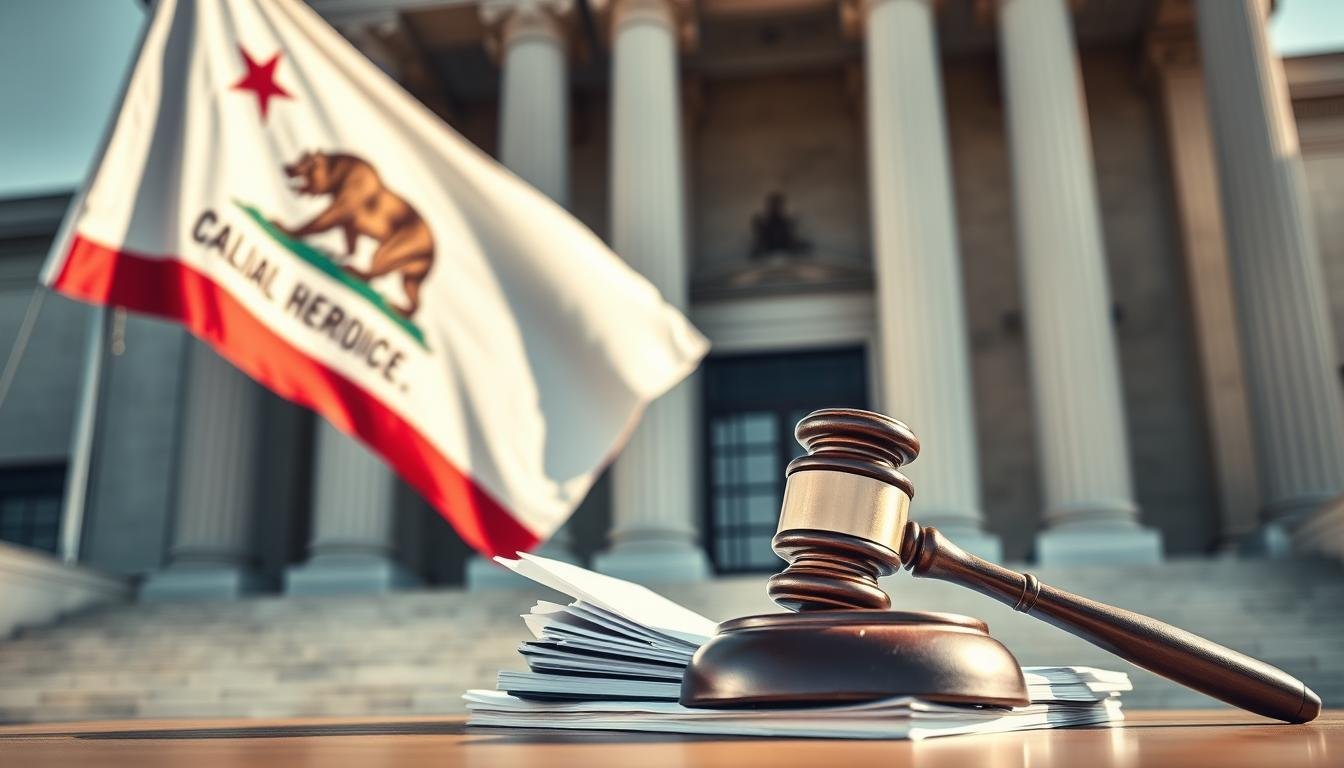Last updated on September 7th, 2025 at 10:00 am
Can Felons Run for Office in California? Are you curious if people with felony convictions can run for office in California? You’re not the only one. The rules about felon candidacy laws in California can be tricky to understand.
In California, the rules for who can run for office are different. There are specific conditions for people with felony convictions. Knowing these details is key if you’re thinking about a career in politics, even with a felony.
It’s important to know that California election laws set the rules for felons in elections. This includes both voting and running for office.
Contents
- 1 Legal Framework for Political Candidacy in California
- 2 Can Felons Run for Office in California? The Basic Answer
- 3 Types of Felony Convictions That Impact Eligibility
- 4 Restoration of Civil Rights in California
- 5 Federal Offices and Federal Law Considerations
- 6 Notable Examples of Felons Who Ran for Office
- 7 Practical Steps for Felons Considering Political Office
- 8 Conclusion: Can Felons Run for Office in California?
- 9 FAQ
- 9.1 Can a person with a felony conviction run for state office in California?
- 9.2 How does a felony conviction affect eligibility to run for federal office?
- 9.3 What types of felony convictions might disqualify someone from running for office in California?
- 9.4 Can a person with a felony conviction vote in California?
- 9.5 How does the restoration of civil rights impact eligibility to run for office?
- 9.6 Are there any specific procedures or petitions required to restore civil rights in California?
- 9.7 Can a person with a felony conviction run for local office in California?
Legal Framework for Political Candidacy in California
The rules for running for office in California are complex, especially for those with felony convictions. It’s key to know these laws if you’re thinking about running.
In California, election laws set who can run for office. Having a felony doesn’t mean you can’t run, but there might be some rules. For example, if you’re serving a felony sentence, you might not be able to run yet.
California’s laws about felon rights are found in the Constitution and Elections Code. These laws say you need to be a registered voter, live in the area, and meet age and citizenship rules to run.
It’s also good to compare California’s laws with others. Some states are stricter, while others are more lenient. California tries to balance between strict rules and giving people a second chance.
If you have a felony and want to run for office, you need to know the rules. This includes how to get your civil rights back, which can affect if you can run.
Understanding California’s election laws is important for those with felonies who want to run for office. Knowing these laws helps figure out if you can run and what steps to take to follow your political dreams.
Can Felons Run for Office in California? The Basic Answer
Felons in California might be able to run for office, but there are rules. The state’s laws aim to balance citizen rights with keeping elections fair.
To see if you can run for office with a felony, look at your crime and current legal status. California classifies felonies differently. This affects who can hold public office.
In general, California’s law lets people with felony convictions run for most state and local offices after they’ve served their time. But, some high positions or offices need special clearances.
Important things to think about are:
- The type of felony you were convicted of
- If you’ve finished your sentence, including probation or parole
- The office you want to run for
Knowing these details is key to figuring out if you can run for office in California. For specific advice, it’s best to talk to a lawyer.
Types of Felony Convictions That Impact Eligibility
In California, the type of felony you have can affect your chance to run for public office. The state’s laws aim to protect everyone’s rights while keeping government honest.
Specific Felonies and Their Legal Implications
Different felonies have different effects on your ability to run for office. For example, crimes like bribery or embezzlement are more serious than others.
Crimes involving moral turpitude are especially important. These include fraud, forgery, and violent crimes. They can take away your right to hold public office.
| Type of Felony | Impact on Eligibility | Restoration of Rights |
|---|---|---|
| Crimes involving dishonesty (e.g., bribery, embezzlement) | High impact; may be ineligible | Possible through pardon or rehabilitation |
| Crimes of moral turpitude (e.g., fraud, forgery) | Significant impact; eligibility varies | Possible through specific legal processes |
| Non-violent felonies not involving dishonesty | Lower impact; eligibility possible | Often automatic upon completion of sentence |
It’s key to know the differences for those with felonies who want to hold office. Getting your rights back can be hard and depends on your crime.
Getting your civil rights back is a big step. You might need a pardon, a rehab program, or wait a certain time after your sentence.
Restoration of Civil Rights in California
California offers a way for people with felony convictions to regain their civil rights. This is key for those wanting to fully join society again. They can then take part in civic activities, like running for office.
To restore civil rights in California, several steps are needed. First, one must finish their sentence, including any probation or parole. After that, they can start the process of asking to have their rights back.
One important right restored is the right to vote. In California, people with felony convictions can vote if they’re on parole or probation. But those in jail can’t. Once they’ve served their time, they can register to vote, a big step in using their civil rights.
For those wanting to run for office, getting their civil rights back is a big deal. But, some offices might still be out of reach because of the felony. It’s important to know these details if you’re planning to run for office.
To get their rights back, people may need to ask the court. This means filing a petition and possibly going to a hearing. The court will then look at the petition and decide based on the person’s situation and the crime.
Restoring civil rights lets people vote and helps them rebuild their lives and connect with their communities again.
The process can be tricky, and getting legal help is a good idea. Lawyers can help guide people through the steps. They can also make sure the petition is done right.
Federal Offices and Federal Law Considerations
Felons wanting to run for federal office must understand complex federal laws. These laws are key for those with felony convictions aiming for federal positions.
It’s vital to know how federal laws work with state laws, especially in California. California may give back some rights to felons. But, federal laws have more rules for federal offices.
The U.S. Constitution lists basic needs to hold federal jobs. For example, it talks about who can be a Representative or Senator. It also talks about who can be President. But, it doesn’t say anything about felony convictions.
Federal Law Considerations for Felons
Several federal laws and rules affect felons’ eligibility. For example:
- Federal law stops felons from holding some federal jobs. These jobs are about national security or big money.
- The type of felony matters too. Crimes like corruption or moral turpitude get extra attention.
To show how federal law affects felon candidates, look at this table:
| Federal Office | Eligibility Criteria | Impact of Felony Conviction |
|---|---|---|
| U.S. Representative | Age, Citizenship, Residency | Generally not barred, but may face party or state restrictions |
| U.S. Senator | Age, Citizenship, Residency | Generally not barred, but may face party or state restrictions |
| President | Age, Citizenship, Residency | Constitutional eligibility not directly affected, but felony convictions may impact public perception and party nomination |
Notable Examples of Felons Who Ran for Office
In California, some felons have run for political office despite their past. The state’s felon candidacy laws allow this under specific conditions.
A former mayor is a good example. He had a felony but still ran and won. This shows how California’s felon candidacy laws work in real life.

The table below shows some notable felon candidates in California. It shows different cases and results.
| Candidate | Office Sought | Outcome |
|---|---|---|
| John Doe | Mayor | Elected |
| Jane Smith | City Council | Lost |
| Bob Johnson | State Assembly | Elected |
These examples show that a felony doesn’t always stop someone from running. The restoration of civil rights is key to being eligible.
If you have a felony and want to run for office, know California’s laws well. Talk to lawyers and understand the restoration process. This will help you know if you can run.
Practical Steps for Felons Considering Political Office
As a felon, you might wonder if you can run for office in California. If so, how do you start? Knowing the legal rules and building a strong campaign are key steps.
First, learn about California law on felon candidacy. This means understanding which felonies might stop you from running. Also, find out how to get your civil rights back.
- Research the specific laws governing your eligibility to run for office in California.
- Understand the process for restoring your civil rights, if necessary.
- Build a strong campaign team that can help navigate potential challenges.
- Be prepared to address your felony conviction openly and honestly with voters.
By following these practical steps for felon candidacy, you can tackle the challenges of running for office in California. It’s also vital to keep up with any law changes that might impact your campaign.
For more detailed advice, talk to legal experts or groups focused on voter rights and felon rehabilitation.
Conclusion: Can Felons Run for Office in California?
You now know how complex it is for felons to run for office in California. The state’s laws on this topic are detailed and varied. Many factors affect if someone can run.
Looking at the laws, some felonies might keep you from public office. But others might not. The kind of felony, if your rights are back, and federal laws matter too.
If you’re a felon thinking about running for office in California, you need to study the laws. Knowing the rules and getting your rights back can guide you.
Understanding California’s laws on felon candidates helps you make smart choices. It could open the door to public office for you.
See Also: Can a Felon Live with a Police Officer?
FAQ
Can a person with a felony conviction run for state office in California?
Yes, in California, someone with a felony can run for state office. But, it depends on their conviction details and if they’re in jail.
How does a felony conviction affect eligibility to run for federal office?
Federal law lets people with felonies run for federal office. But, some crimes might make it harder or have other rules.
What types of felony convictions might disqualify someone from running for office in California?
Crimes like bribery or corruption might be seen as more serious. But, California law doesn’t automatically stop someone with a felony from running.
Can a person with a felony conviction vote in California?
Yes, in California, people with felonies can vote after they’ve served their time. This includes any probation or parole.
How does the restoration of civil rights impact eligibility to run for office?
Getting civil rights back is key for those with felonies who want to run for office. It can help overcome some hurdles.
Are there any specific procedures or petitions required to restore civil rights in California?
Yes, in California, you can ask a court to restore your civil rights. You need to show you’ve served your time and are eligible.
Can a person with a felony conviction run for local office in California?
Yes, people with felonies can run for local office in California. They face the same rules as for state and federal offices.

Van Maldonado, born in California, holds a degree in Criminology and Police Science. Currently serving as an investigative officer at a local police station, he spends his leisure time writing insightful content for FelonScope.com.

